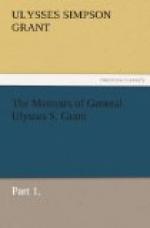In their modes of expressing thought, these two generals contrasted quite as strongly as in their other characteristics. General Scott was precise in language, cultivated a style peculiarly his own; was proud of his rhetoric; not averse to speaking of himself, often in the third person, and he could bestow praise upon the person he was talking about without the least embarrassment. Taylor was not a conversationalist, but on paper he could put his meaning so plainly that there could be no mistaking it. He knew how to express what he wanted to say in the fewest well-chosen words, but would not sacrifice meaning to the construction of high-sounding sentences. But with their opposite characteristics both were great and successful soldiers; both were true, patriotic and upright in all their dealings. Both were pleasant to serve under—Taylor was pleasant to serve with. Scott saw more through the eyes of his staff officers than through his own. His plans were deliberately prepared, and fully expressed in orders. Taylor saw for himself, and gave orders to meet the emergency without reference to how they would read in history.
CHAPTER XI.
Advance on the city of Mexico—battle
of Contreras—assault at
Churubusco—negotiations for
peace—battle of Molino
del Rey—storming
of Chapultepec—San Cosme—evacuation
of the city—Halls of
the
Montezumas.
The route followed by the army from Puebla to the City of Mexico was over Rio Frio mountain, the road leading over which, at the highest point, is about eleven thousand feet above tide water. The pass through this mountain might have been easily defended, but it was not; and the advanced division reached the summit in three days after leaving Puebla. The City of Mexico lies west of Rio Frio mountain, on a plain backed by another mountain six miles farther west, with others still nearer on the north and south. Between the western base of Rio Frio and the City of Mexico there are three lakes, Chalco and Xochimilco on the left and Texcoco on the right, extending to the east end of the City of Mexico. Chalco and Texcoco are divided by a narrow strip of land over which the direct road to the city runs. Xochimilco is also to the left of the road, but at a considerable distance south of it, and is connected with Lake Chalco by a narrow channel. There is a high rocky mound, called El Penon, on the right of the road, springing up from the low flat ground dividing the lakes. This mound was strengthened by intrenchments at its base and summit, and rendered a direct attack impracticable.




